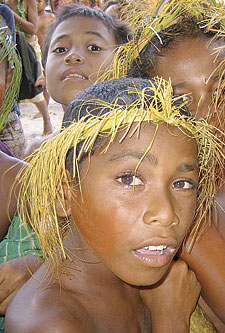Daily media reporting draws our attention to overseas events. Sometimes the attention is fleeting, sometimes it is sustained and the extent of reporting usually determines the issue's gravity in our eyes. Fleeting media attention often means we remain oblivious to horrific human rights abuses and disaster situations.
Media hype turns an event into a major crisis. But as soon as journalists lose interest, a matter becomes "yesterday's story' and it slips from our minds.
In many of our congregations we are, unfortunately, locally focused. Overseas issues hardly gain our attention when we are gathered together. Or if they do, it is in one brief prayer. In fact the intercessions in our Sunday services are often a clue to the breadth, or lack of breadth, of our understanding of world issues and events.
 The coverage of the recent tsunami in the Solomon Islands and the shootings of students and staff at Virginia Tech are an interesting comparison. The former disaster slipped from our consciousness in a few days. The latter continued for much longer. Yet here in Australia, the tsunami was in our neighbourhood. The latter, though a horrific, violent event, was much further away.
The coverage of the recent tsunami in the Solomon Islands and the shootings of students and staff at Virginia Tech are an interesting comparison. The former disaster slipped from our consciousness in a few days. The latter continued for much longer. Yet here in Australia, the tsunami was in our neighbourhood. The latter, though a horrific, violent event, was much further away.
However the wealth of media coverage from the US kept drawing us back to Virginia Tech. Over 30 victims died, many more were injured, families and friends were and are grief-stricken. Yet a cold examination might ask: did we remember how many more people died in explosions in Iraq, or how many starving children died in their mothers' arms in Sudan's Darfur region at the same time?
Many people died or were swept away by the waves near Gizo, over 300km north-west of Honiara, the capital of the Solomons.
Here in Australia we went onto tsunami watch. People were advised to move away from the shore on the eastern seaboard. They did so in our usual lackadaisical Aussie fashion.
But now we Australians seem to have forgotten the Solomons' tsunami, apart from Christian NGOs who have raised funds and sent people there to help the islanders re-build after the disaster. ABM, AngliCORD and World Vision are all assisting to my knowledge.
We should not forget our neighbours in the nearby Pacific. They are spiritually aware and have lively churches on many islands, although Christian service there is sometimes undertaken at some risk. It is not so long since we read of the murder of Anglican evangelists. But Anglican communities such as the Sisters of the Church, who arrived in Honiara on Christmas Eve 1970, are places of refuge for the people when there is political unrest or some natural disaster. There has been a Solomons' Anglican ministry since 1849 when George Augustus Selwyn, first bishop of New Zealand, founded the Melanesian Mission.
The shootings at Virginia Tech were frightening, another in the series of murders in US educational institutions. Remember the Amish schoolgirls shot by a crazed killer in Pennsylvania some 16 months ago, and the Columbine murders a decade ago?
Many people are seeking reasons. The easy access to guns for United States citizens is a clue. The right to own a gun to defend oneself is strongly defended by a large majority of Americans. There is a very powerful and politically-savvy US gun lobby.
We should still be praying for the families and friends of the victims of both the Solomons tsunami and Virginia Tech shootings, and encouraging continued support for them.
But if we are tempted to ask "why', or allow people to blame God, we should consider the words of Bishop N T Wright of Durham who wrote in the Washington Post: "God is not a lofty CEO of the universe, running the world as if at a distance. He is strangely present in the midst of horror and violence, taking its main weight in himself, and working from within to bring healing and hope. God is with us, grieving."




















